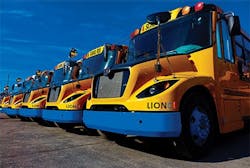Lion Awarded $38M by EPA Clean School Bus Program to Deploy 97 e-School Buses and Charging Infrastructure
The Lion Electric Company (Lion), an all-electric medium and heavy-duty urban vehicles manufacturer, has been awarded $38 million for 97 school buses and related charging infrastructure as part of the U.S. Environmental Protection Agency’s Clean School Bus Program.
Under this latest round of awards, the EPA has doubled its funding amount – allocating nearly $1 billion to 67 applicants. According to the EPA, these awards are projected to facilitate the purchase of more than 2,700 clean school buses in 280 school districts that serve over 7 million students across 37 states.
“The ongoing investment from the federal government for cleaner school buses will tangibly contribute to the well-being of our children and communities, reduce greenhouse gas emissions, and increase the number of electric school buses on American roads,” said Nicolas Brunet, President of Lion.
Approximately 70% of all units awarded under this round of the program have been directly granted to school districts, financial entities, and third-party contractors.
In addition to this round of financing, the EPA is currently accepting applications for the 2023 Clean School Bus Rebate Program, which the agency expects to award at least $500 million in funding under this round by April 2024.
About the Author
EnergyTech Staff
Rod Walton is head of content for EnergyTech.com. He has spent 17 years covering the energy industry as a newspaper and trade journalist.
Walton formerly was energy writer and business editor at the Tulsa World. Later, he spent six years covering the electricity power sector for Pennwell and Clarion Events. He joined Endeavor and EnergyTech in November 2021.
He can be reached at [email protected].
EnergyTech is focused on the mission critical and large-scale energy users and their sustainability and resiliency goals. These include the commercial and industrial sectors, as well as the military, universities, data centers and microgrids.
Many large-scale energy users such as Fortune 500 companies, and mission-critical users such as military bases, universities, healthcare facilities, public safety and data centers, shifting their energy priorities to reach net-zero carbon goals within the coming decades. These include plans for renewable energy power purchase agreements, but also on-site resiliency projects such as microgrids, combined heat and power, rooftop solar, energy storage, digitalization and building efficiency upgrades.
